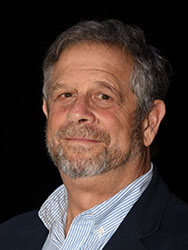Former Fogarty grantee and Argentine health minister discusses Latin America’s noncommunicable disease crisis
January / February 2021 | Volume 20 Number 1
Q and A with Dr Adolfo Rubinstein, MD, PhD

Photo courtesy of IECS.org
Dr. Adolfo Rubinstein, MD, PhD
Dr. Adolfo Rubinstein served as Argentina’s Minister of Health for two years ending in 2019 and subsequently was the founding director of his country’s
Center for Implementation and Innovation in Health Policies. Rubinstein is also a professor of public health and family medicine at the University of Buenos Aires and a visiting professor at Harvard. A recipient of
numerous Fogarty and NIH grants, Rubinstein has published more than 120 papers. His research focuses on the epidemiology and implementation of preventive interventions to control noncommunicable diseases (NCDs) and the evaluation of health programs and policies.
Please tell us about your varied career.
My journey through medicine has been a long one! I was trained as a general internist first and then moved to primary care and retrained to be a family doctor. I created a very large academic division of family medicine at one of the largest teaching hospitals in Argentina and was the chairman there for 20 years. Along with teaching, I was like the “founding father” of the Institute for Clinical Effectiveness and Health Policy, which is devoted to research and capacity building mainly in the areas of NCD research and epidemiology.
During my term as health minister, we developed programs focused on chronic diseases - not only research and training, but also implementation. For instance, we devoted a lot of our research budget to chronic disease implementation research projects. We also supported the Global Alliance for Chronic Diseases and, under this umbrella, we conducted research while forging programs at a national level to counter hypertension, diabetes and cardiovascular disease.
What was the goal of your Fogarty NCD grant?
The chronic disease burden - cardiovascular disease, cancer, diabetes, pulmonary disease and mental health problems - is trending up in Argentina as it is in the rest of the world, with NCDs accounting for more than 70% of the total disease burden. Yet we lack the professional capabilities, mainly in terms of research, to deal with this. The priority of my project was to train new researchers and young investigators and get them involved in NCD research, particularly cardiovascular problems. The most significant results are the continuing careers of the young investigators we trained - three PhDs and six master’s degree students. At the same time, hundreds of people received short-term education through the faculty development program. These trainees did not come solely from Argentina, but also Uruguay, Brazil, Peru, Chile, Paraguay, Bolivia and other countries in the region. Overall, the experience was marvelous. We learned not only a lot of
things but also a lot of
perspectives on how to address noncommunicable disease research and teaching.
Fogarty plays such an important role for developing countries. My institution has also sponsored a lot of U.S. Fogarty fellows who came to receive training and experience in a developing country. In turn, they elevated our research standards and helped us to advance.
What research are you doing now?
Currently, I focus more on delivery science as I’m trying to bridge the gap between implementation
research and implementation in the
real world. I examine the streams of policy changes and the politics behind them. The center that I created in 2000 is mainly devoted to translating science into practice, which, of course, must be founded on evidence-based research. Essentially, what I’m trying to do is to interact with different stakeholders and to understand how politicians, particularly, think and how I might influence them to advance evidence-based policies. How do we inspire them to prioritize policies that reduce the NCD burden? For example, I believe front-of-package labeling for processed foods would have a direct impact on individual and population health. While minister, I worked on adopting this policy and I continue to work on this.
What should the Fogarty community consider?
I often find investigators are very far from policy. If you want your research to have impact, you have to learn why policymakers do what they do. By listening more, we will begin to have more innovative, out-of-the-box thinking in global health. One of the most important things is to bridge the worlds of research and policymaking. We have to try to bring both worlds closer together. Young investigators in global health need to understand both arenas. You have to think how policymakers think for your research to result in changes.
More Information
To view Adobe PDF files,
download current, free accessible plug-ins from Adobe's website.
Related World Regions / Countries
Related Global Health Research Topics